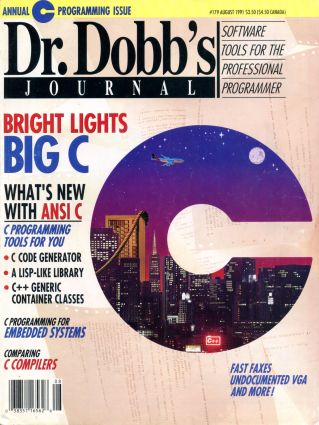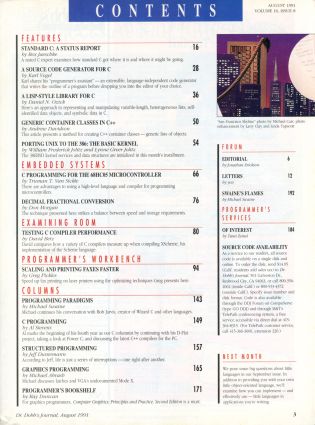
[author : Jonathan Erickson] #Edito
TABLE OF CONTENTS
[author : Rex Jaeschke]
A noted expert examines how standard C got where it is and where it might be going.
[author : Karl Vogel]
Karl shares his "programmer's assistant"—an extensible, language-independent code generator that writes the outline of a program before dropping you into the editor of your choice.
[author : Daniel N. Ozick]
Here's an approach to representing and manipulating variable-length, heterogeneous lists, self-identified data objects, and symbolic data in C.
[author : Andrew Davidson]
This article presents a method for creating C++ container classes—generic lists of objects.
[author : William Frederick Jolitz and Lynne Greer Jolitz]
The 386BSD kernel services and data structures are initialized in this month's installment.
[author : Truman T. Van Sickle]
There are advantages to using a high-level language compiler for programming microcontrollers.
[author : Don Morgan]
The technique presented here strikes a balance between speed and storage requirements.
[author : David Betz]
David compares how a variety of C compilers measure up when compiling XScheme, his implementation of the Scheme language.
[author : Greg Pickles]
Speed up fax printing on laser printers using the optimizing techniques Greg presents here.
[author : Michael Swaine]
Michael continues his conversation with Bob Jarvis, creator of Wizard C and other languages.
[author : Al Stevens]
Al marks the beginning of his fourth year as our C columnist by continuing with his D-Flat project, taking a look at Power C, and discussing the latest C++ compilers for the PC.
[author : Jeff Duntemann]
According to Jeff, life is just a series of interruptions—one right after another.
[author : Michael Abrash]
Michael discusses latches and VGA's undocumented Mode X.
[author : Ray Duncan]
For graphics programmers, Computer Graphics: Principles and Practice, Second Edition is a must.
[author : you]
[author : Michael Swaine]
[author : Tami Zemel]
